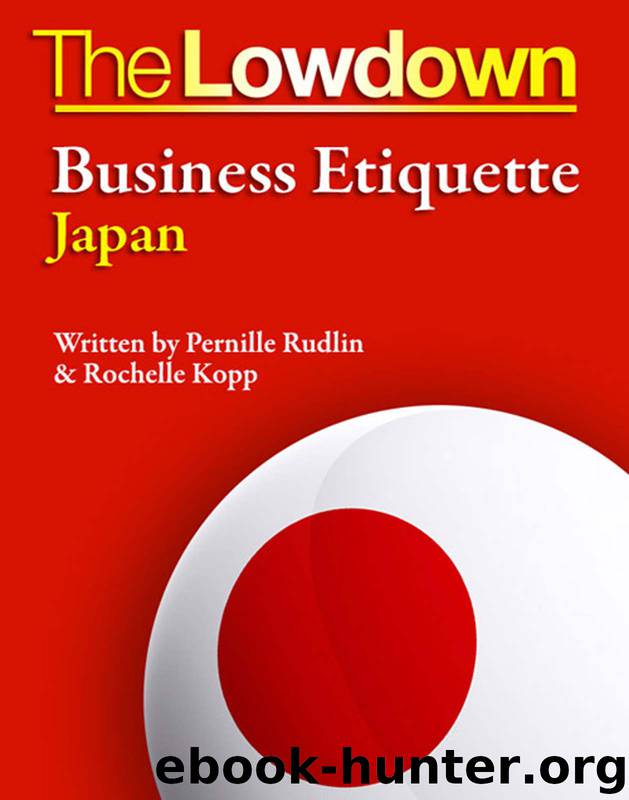Business Etiquette Japan by Rochelle Kopp

Author:Rochelle Kopp [Rudlin, Pernille and Kopp, Rochelle]
Language: eng
Format: epub
ISBN: xxxxxxxxxxxxx
Publisher: Creative Content Ltd
PART 9: THINGS TO AVOID
Q: All this business with taking off shoes and not wearing slippers on the tatami matting and so on – is this because there is a taboo about feet being unclean, like in other parts of Asia?
A: It’s not quite the same as (for example) Thailand, where you have to be careful not to point your feet at people, but there are a lot of taboos around cleanliness, purity and contamination, originating from the Shinto religion. The Shinto religion evolved in Japan before Buddhism – it’s an animistic religion, worshipping spirits in the environment, centered on conducting rituals and making offerings to placate those spirits.
Obviously taking off shoes can be practical as well, as it avoids tracking dirt from your shoes into the house or restaurant or hotel. However, there is also a traditional emphasis in Japan on ritual cleanliness. When entering a Shinto shrine you’ll find a place to wash your hands and rinse out your mouth, as a kind of ritual purification. If anything does get contaminated – for example by death, or blood – then various rituals have to be undertaken to purify the person or the area that was contaminated. Often salt is used – you’ll have seen sumo wrestlers throw salt around to purify the arena, and sometimes you see little piles of salt at the entrance to houses. People use salt to purify themselves if they have been to a funeral, for example, before entering the house.
Q: So are there any taboos that have come out of Buddhism?
A: Actually, there used to be a Buddhist taboo against eating meat, and drinking alcohol, but you won’t see many Japanese people following that now! I think the Buddhist influence is more subtle in Japanese society today. It can be seen in some key notions like enryou, which I suppose we would call “self restraint,” and meiwaku, which means causing annoyance to others – so you’ll see in public areas that Japanese people won’t use their cell phones for voice calls, even in coffee shops or on trains, although they may well be busy tapping away on them sending emails and using the internet. Even this is frowned on by some Japanese, as there is a worry (probably baseless) that wireless devices interfere with heart pace makers.
In general, Japanese people try to keep themselves as unobtrusive as possible in public areas; they tend not to cross their legs, or sprawl across seats, or carry large luggage. It’s also not considered polite to eat in public and in general, when eating socially, you will see that people leave some of the food on the communal plates – to show enryou.
There’s one other thing I shouldn’t forget to mention – Japanese people find loud nose blowing, especially into a cotton hanky, really disgusting. Unfortunately, Westerners tend to find the Japanese tactic of dealing with a cold – loud and repeated sniffing – pretty irritating too. One solution to this, if you are in a meeting and have a cold, is to blow your nose discreetly into a paper tissue, when no one’s looking.
Download
This site does not store any files on its server. We only index and link to content provided by other sites. Please contact the content providers to delete copyright contents if any and email us, we'll remove relevant links or contents immediately.
Tools of Titans by Timothy Ferriss(8363)
Change Your Questions, Change Your Life by Marilee Adams(7753)
Deep Work by Cal Newport(7059)
Playing to Win_ How Strategy Really Works by A.G. Lafley & Roger L. Martin(6219)
Man-made Catastrophes and Risk Information Concealment by Dmitry Chernov & Didier Sornette(6001)
Big Magic: Creative Living Beyond Fear by Elizabeth Gilbert(5753)
Digital Minimalism by Cal Newport;(5747)
Ego Is the Enemy by Ryan Holiday(5412)
The Slight Edge by Jeff Olson(5409)
The Motivation Myth by Jeff Haden(5202)
The Laws of Human Nature by Robert Greene(5170)
Stone's Rules by Roger Stone(5080)
Tuesdays with Morrie by Mitch Albom(4767)
Eat That Frog! by Brian Tracy(4519)
Rising Strong by Brene Brown(4448)
Skin in the Game by Nassim Nicholas Taleb(4235)
The Money Culture by Michael Lewis(4196)
Bullshit Jobs by David Graeber(4177)
Skin in the Game: Hidden Asymmetries in Daily Life by Nassim Nicholas Taleb(3987)
